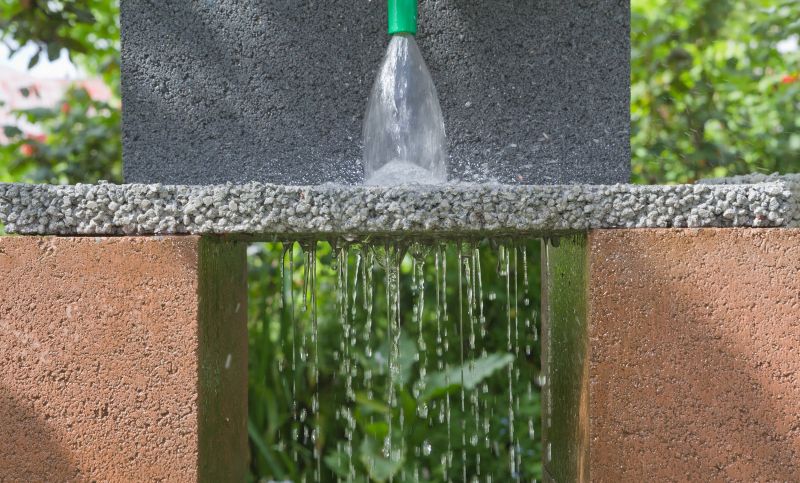Permeable Pavements for Groundwater and Soil Management
Published on by Rituraj Phukan, Chief Operating Officer at Walk For Water in Technology
Permeable pavements have emerged as an environmentally friendly alternative for combining Groundwater Protection with Soil Management.
What is it and how should it be used?:
 We coat our roads in asphalt and concrete, solid materials that do not allow water to flow through them, which leads to surface run-off. This is a big problem in most urban areas as their already over-used drainage systems cannot cope with the extra water. This also puts their rivers and lakes at risk of flooding.
We coat our roads in asphalt and concrete, solid materials that do not allow water to flow through them, which leads to surface run-off. This is a big problem in most urban areas as their already over-used drainage systems cannot cope with the extra water. This also puts their rivers and lakes at risk of flooding.
Permeable pavement is a porous alternative to asphalt and concrete, meaning that it allows water to seep through it and flow down to the soil. This would greatly reduce surface run-off and the risk of flooding. The technology envisages the replacement of old roads with new permeable roads reusing the same materials.
In the past 40 years, 17% of permeable ground surface in London has been lost, mainly due to the trend of people turning their front gardens into parking spaces. Adding that to increased housing, roads and other infrastructure slowly taking over green spaces, cities like London are facing a catastrophic future as sewers are already struggling with surface run-off, with centuries old CSO (Combined Sewer Overflow) where storm water mixes with human waste. In the future even mild precipitation would lead to flooding of these cities.
This is where permeable pavement comes in. By using this alternative, we would allow people to continue to build houses/roads and convert their driveways without compromising the soil's ability to absorb water. The porous surface would ensure water flowing back into the soil, keeping a stable water cycle, helping the ecosystem and reducing the strain on our drainage. It would also minimize the pollutants from parking lots mixing into our water as rain would immediately drain into the soil instead of washing away the harmful chemicals.
However, the applicability of permeable pavements is limited in cold environments like those of Scandinavia or Canada. The heavy salting of roads after snow and ice would lead to the salinization of the soil due to the porous surface absorbing the melted snow/salt mix. This could heavily damage the quality of the soil as well as the plants that grow from it, causing massive environmental degradation.
Media
Taxonomy
- Public Health
- Treatment
- Technology
- Environment
- Water Supply
- Infrastructure
- Hydrology
2 Comments
-
Very interesting. Stormwater BMPs like permeable pavement are one of the most effective ways to protect our receiving waters from the impacts of urban runoff and for greater groundwater infiltration and stormwater retention. This market is growing very fast here in California as we have some of the strictest stormwater environmental regulations and standards when it comes to construction and industrial discharges. The key downside to it is the very high upfront cost of it and it's not always very cost effective but it pays off in the long term with reduced flooding and pollution impacts.
However, not only does it bring those benefits along with increasing pervious surfaces to reduce the flow volume, erosion, and scouring of our rivers and lakes but recent research in huge megalopolises like Los Angeles where I was raised has found that cool pavement that is less black and more gray can reduce the impacts of the heat island effect. With the impacts of global warming set to cause much warmer weather the use of cooler pavement that's permeable may help to reduce the impacts of extreme heat waves, deaths from air pollution and extreme heat will help cool the streets and surrounding homes. Pilot research in Los Angeles has found that global warming potential can get reduced by up to 10% and will be better for public health. Very fascinating research! Any comments or feedback on this? Thanks.
-
Bonjour
N'importe quoi: comment des gens réfléchis peuvent penser un seul instant que la pollution des sols ne pénétrera plus vers les sous sols?
c'est totalement irréaliste. On est dans la même configuration des planches sablonneuses des stations dépuration et des aires de stockage des boues d'excréments. En période de fortes précipitations pluviales toutes la pollution est dispersée dans l'environnment. Certainement pas au même endroit du pavement, bien plus loin. Mais en amont des pavements la pollution suit le même cheminement et pénètre elle aussi sous le pavement.
Idée totalemetn incongrue
Hello anything: How thoughtful people may think a minute that pollution of soils will more penetrate towards the soil?
It's totally unrealistic. We're in the same configuration of sandy boards stations depuration and sludge of waste storage areas. During a heavy storm rainfall all the pollution is dispersed in the environment. Certainly not in the same place of the pavement, but further away. Upstream of the pavements pollution follows the same path and it also penetrates under the pavement.
Totally incongruous idea